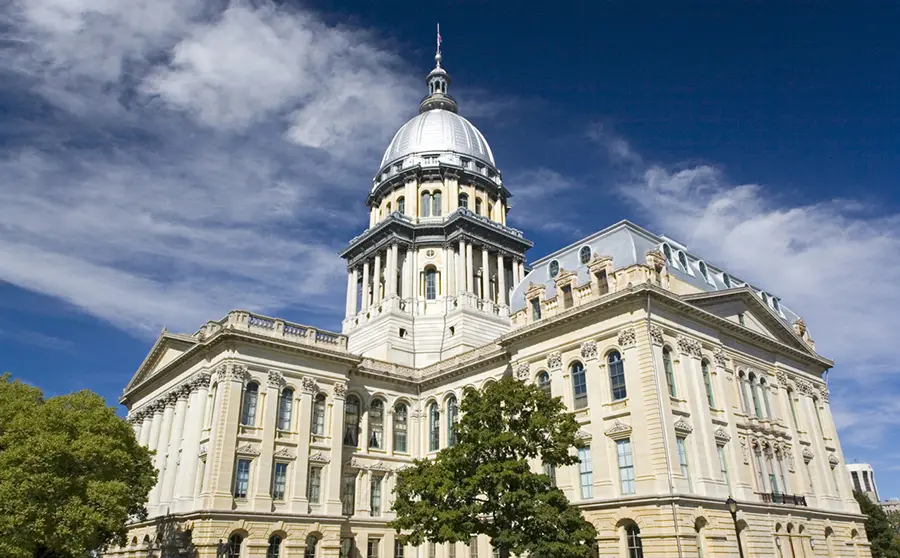
March 18, 2024
The Shriver Center on Poverty Law fights for economic and racial justice. Over nearly 60 years, we have secured law and policy victories with and for people experiencing economic instability across the state. The Shriver Center advocates for progressive policies and laws that address long-standing inequities, strengthen families, and fuel opportunity in marginalized communities. Our 2024 Illinois advocacy agenda supports and protects workers, expands access to health care, promotes inclusive housing, and keeps families strong and stable.
Here are ways lawmakers can help ensure economic and racial justice in Illinois:
HB 3950 Provide a child tax credit (Rep. Evans / Sen. Aquino) – The temporary expansion of the federal child tax credit in 2021 lifted 2.1 million children out of poverty.This legislation would create a refundable $300 per child credit in Illinois that is tied to tax filers’ income.
Ensure guaranteed income – Systemic inequities and the legacy of structural racism makes it difficult for people living in poverty and people of color to achieve financial stability. Guaranteed income programs give people with low income direct cash payments they can spend as needed. This legislation would create a permanent, state-funded guaranteed income program. –
HB2966 / SB1317 Ensure that more people with low income can drive to access employment (Rep. Smith / Sen. Villanueva) – Over 100,000 Illinoisians have suspended driver’s licenses for failure to appear in court, often due to their inability to pay a fine or fee. Preventing people from having a license creates a barrier to employment and their ability to take care of themselves and their families. This bill would eliminate driver’s license suspensions as a sanction for failing to appear in response to a court summons related to traffic tickets.
Demand paid family and medical leave – The Illinois Time to Care coalition is committed to elevating the importance of a statewide paid family and medical leave (PFML) program. This state-operated insurance program would provide all workers with paid, job-guaranteed leave.
HB 5395/SB 3739 Curb predatory health insurance practices and make care more affordable (Rep. Moeller/Sen. Peters) – Insurance companies use predatory practices to restrict access to care and boost profits.This omnibus bill will ban short-term, limited duration health plans and end prior authorization for in-patient mental health treatment. Insurers will no longer be able to force people to try cheaper alternatives before taking prescribed medications. The legislation will eliminate inaccurate listings of in-network providers, also called ghost networks. The “rate review” process will expand to include large-group plans and lower premiums overall.
Sustain coverage to all low-income immigrant populations – The Healthy Illinois campaign will focus on sustainability of the Health Benefits for Immigrant Adults (HBIA) and Health Benefits for Immigrant Seniors (HBIS) programs. The campaign will advocate to eliminate current enrollment caps; advocate for coverage of all medical services for enrollees of both programs, including currently excluded long term services and supports (LTSS); and champion the expansion of HBIA to 19-to 41-year-olds.
Implement a state-based exchange and insurance rate review – We will advocate for equitable and affordable policy choices during the creation of a state health insurance marketplace, along with transparency and enforcement of rate review to ensure affordability and accessibility of private insurance for individuals and small employers.
Stop crime-free housing and nuisance ordinances (Rep. Ford / Sen. Villa) – Some Illinois municipalities have enacted so-called “crime-free housing and nuisance property” ordinances (CFNOs), with the misguided belief that they are effective at fighting crime and keeping communities safer. Rather, CFNOs result in unfair penalties and evictions of tenants based on alleged criminal or nuisance activity, leading to instability and homelessness, which compromises public safety. This bill would end crime-free housing and nuisance ordinances to protect tenants and keep people in their homes.
SB 2158 End housing banishment (Rep. Lilly / Sen. Lightford) – Illinois imposes draconian residency restrictions for people on public conviction registries so that it is impossible for many people to find a place to live outside of a rural setting. These policies cause chronic homelessness, especially among Black men; have no benefits for public safety; and likely work to its detriment. This bill reduces residency restrictions of restricted zones by half, grandfathers people into their existing stable housing, and eases the weekly registration requirements placed on people experiencing homelessness.
SB376 Protect innocent families (Rep. Lilly / Sen. Lightford) – When a child is brought to a doctor or hospital with specific symptoms — such as unexplained bruises, fractures, seizures, or failure to thrive — the case is often immediately brought to a child abuse pediatrician (CAP) to provide a forensic opinion that will be used to both assess and prosecute the parents for child abuse. This legislation would help protect families from wrongful allegations of child abuse.
We need your help. Call your legislators and make sure they support these measures.
Our policies and laws must value families, center communities, and end racial inequities.
Fiscal policies should ensure that all communities can thrive.
Everyone should be paid decently and have basic workplace protections.
Healthcare is a human right. The high cost of care means millions of families have no access to the critical care all human beings deserve.
Shelter is not only a basic human need, it is also critical to people’s ability to pursue and attain economic stability.
Housing is fundamental to achieving economic stability, better health outcomes, and thriving families and communities.